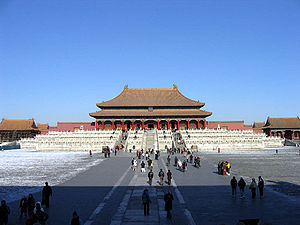
Imperial Court
Encyclopedia

Empire
The term empire derives from the Latin imperium . Politically, an empire is a geographically extensive group of states and peoples united and ruled either by a monarch or an oligarchy....
(see List of empires).
For example:
- The noble court of an Emperor of ChinaEmperor of ChinaThe Emperor of China refers to any sovereign of Imperial China reigning between the founding of Qin Dynasty of China, united by the King of Qin in 221 BCE, and the fall of Yuan Shikai's Empire of China in 1916. When referred to as the Son of Heaven , a title that predates the Qin unification, the...
, Emperor of JapanEmperor of JapanThe Emperor of Japan is, according to the 1947 Constitution of Japan, "the symbol of the state and of the unity of the people." He is a ceremonial figurehead under a form of constitutional monarchy and is head of the Japanese Imperial Family with functions as head of state. He is also the highest...
, Emperor of EthiopiaEmperor of EthiopiaThe Emperor of Ethiopia was the hereditary ruler of Ethiopia until the abolition of the monarchy in 1974. The Emperor was the head of state and head of government, with ultimate executive, judicial and legislative power in that country...
, Emperor of AustriaEmperor of AustriaThe Emperor of Austria was a hereditary imperial title and position proclaimed in 1804 by the Holy Roman Emperor Francis II, a member of the House of Habsburg-Lorraine, and continually held by him and his heirs until the last emperor relinquished power in 1918. The emperors retained the title of...
, Emperor of IndiaEmperor of IndiaEmperor/Empress of India was used as a title by the last Mughal emperor Bahadur Shah II, and revived by the colonial British monarchs during the British Raj in India....
, Emperor of Persia, etc. - The pre-Meiji periodMeiji periodThe , also known as the Meiji era, is a Japanese era which extended from September 1868 through July 1912. This period represents the first half of the Empire of Japan.- Meiji Restoration and the emperor :...
Imperial Court in KyotoImperial Court in Kyotothumb|left|350px|Front view of Kyoto imperial palaceImperial Court in Kyoto was the nominal ruling government of Japan from 794 AD until the Meiji Era, in which the court was moved to Tokyo and integrated into the Meiji government.... - The noble courts of the Roman EmpireRoman EmpireThe Roman Empire was the post-Republican period of the ancient Roman civilization, characterised by an autocratic form of government and large territorial holdings in Europe and around the Mediterranean....
, German EmpireGerman EmpireThe German Empire refers to Germany during the "Second Reich" period from the unification of Germany and proclamation of Wilhelm I as German Emperor on 18 January 1871, to 1918, when it became a federal republic after defeat in World War I and the abdication of the Emperor, Wilhelm II.The German...
, Holy Roman EmpireHoly Roman EmpireThe Holy Roman Empire was a realm that existed from 962 to 1806 in Central Europe.It was ruled by the Holy Roman Emperor. Its character changed during the Middle Ages and the Early Modern period, when the power of the emperor gradually weakened in favour of the princes...
, Austro-Hungarian Empire, Ottoman EmpireOttoman EmpireThe Ottoman EmpireIt was usually referred to as the "Ottoman Empire", the "Turkish Empire", the "Ottoman Caliphate" or more commonly "Turkey" by its contemporaries...
, Zulu EmpireZulu KingdomThe Zulu Kingdom, sometimes referred to as the Zulu Empire or, rather imprecisely, Zululand, was a monarchy in Southern Africa that extended along the coast of the Indian Ocean from the Tugela River in the south to Pongola River in the north....
, Mughal EmpireMughal EmpireThe Mughal Empire , or Mogul Empire in traditional English usage, was an imperial power from the Indian Subcontinent. The Mughal emperors were descendants of the Timurids...
, Byzantine EmpireByzantine EmpireThe Byzantine Empire was the Eastern Roman Empire during the periods of Late Antiquity and the Middle Ages, centred on the capital of Constantinople. Known simply as the Roman Empire or Romania to its inhabitants and neighbours, the Empire was the direct continuation of the Ancient Roman State...
, etc.
In addition, the idea of an "Imperial Court" has given its name to:
- Imperial Court SystemImperial Court SystemThe International Imperial Court System is one of the oldest and largest predominantly gay organizations in the world. The court raises money for charity through large annual fancy-dress costume balls in communities throughout North America and numerous smaller fundraisers each year...
, non-profit organization in North America - Imperial Courts, Los Angeles, CaliforniaImperial Courts, Los Angeles, CaliforniaImperial Courts is a public housing project located in Watts, Los Angeles, California.It is located at 11541 Croesus Avenue on Imperial Highway between Grape Street and Mona Boulevard, near the 105 Freeway....
, public housing

